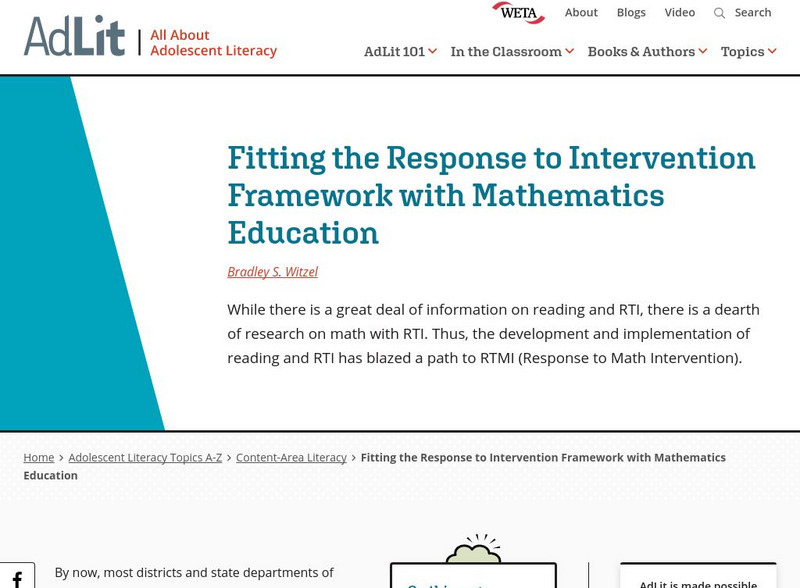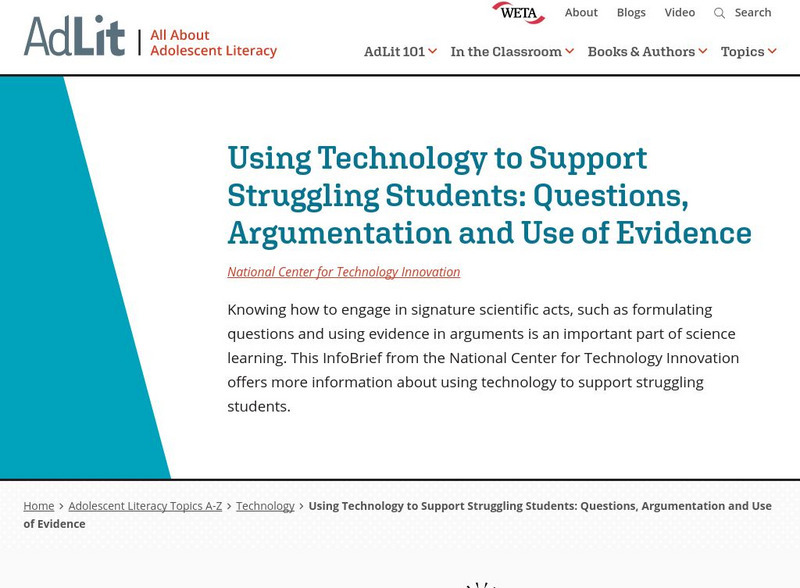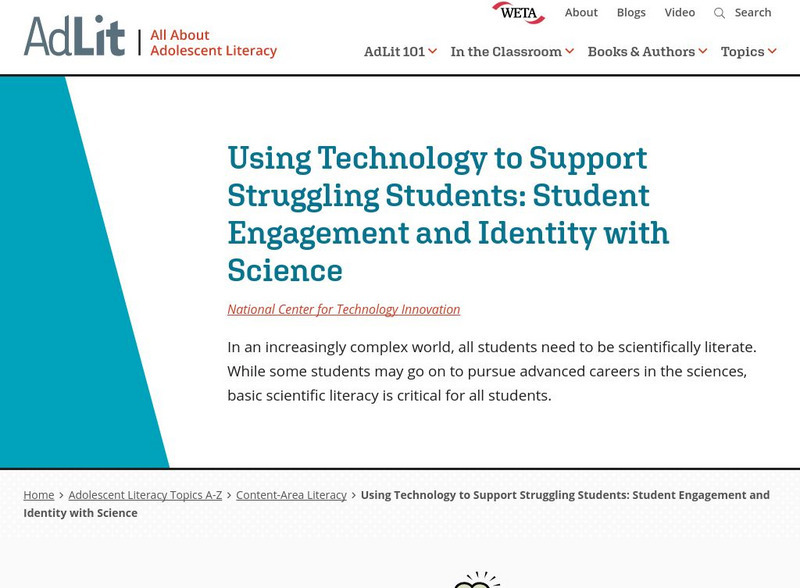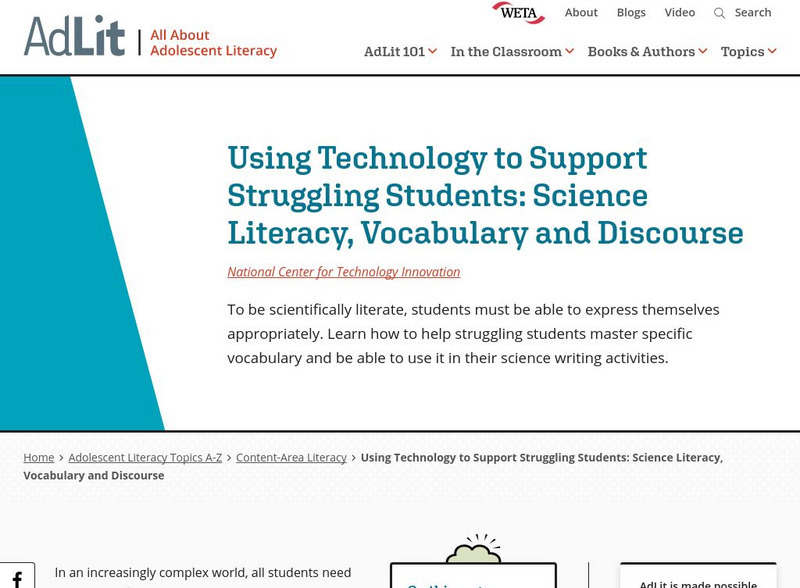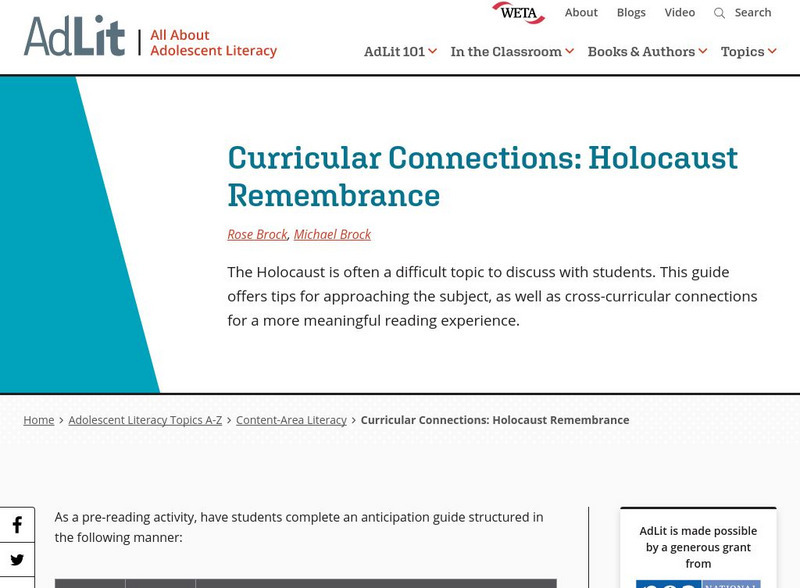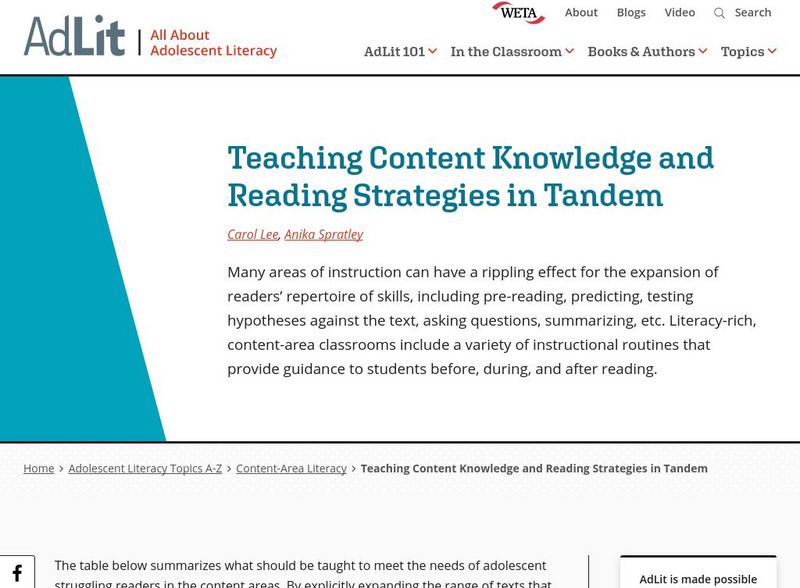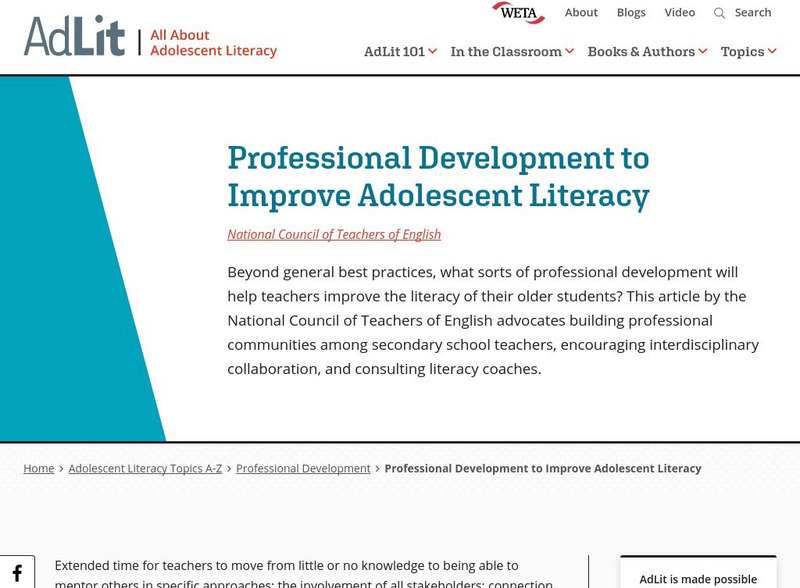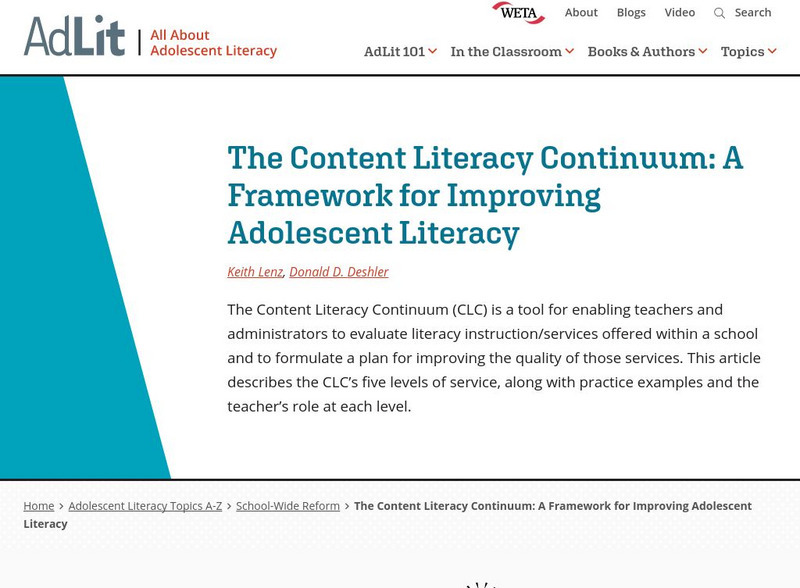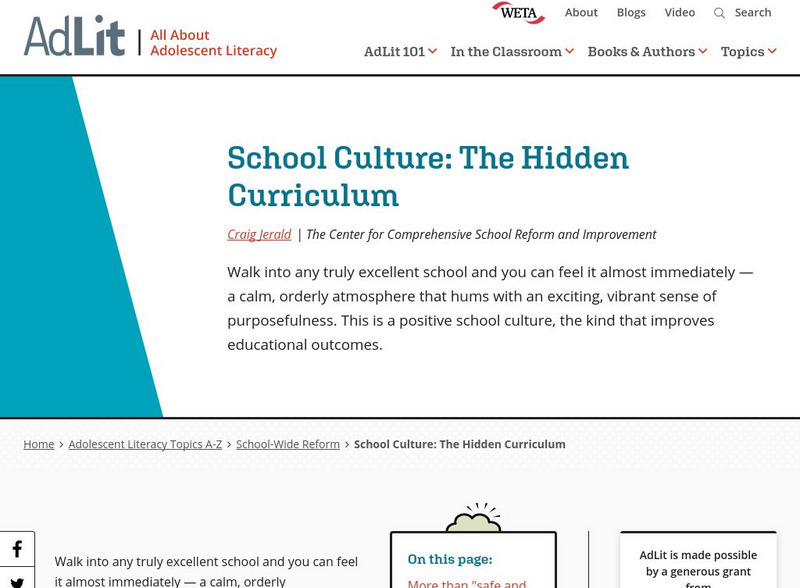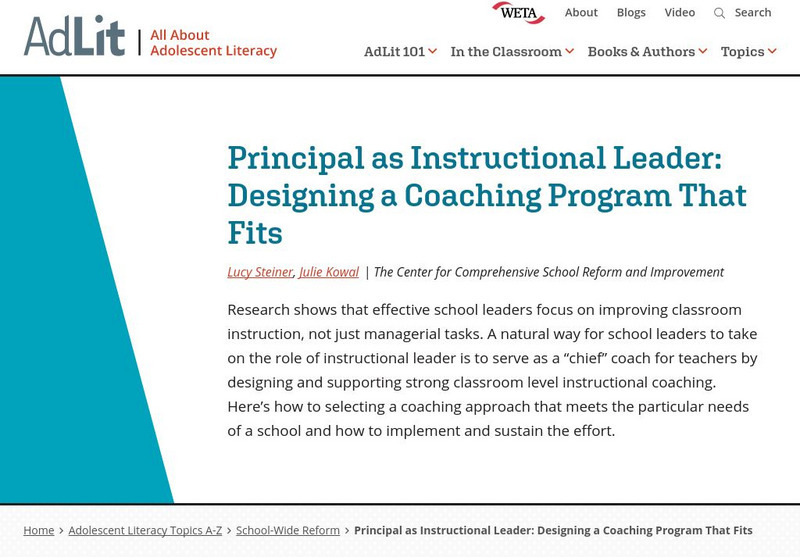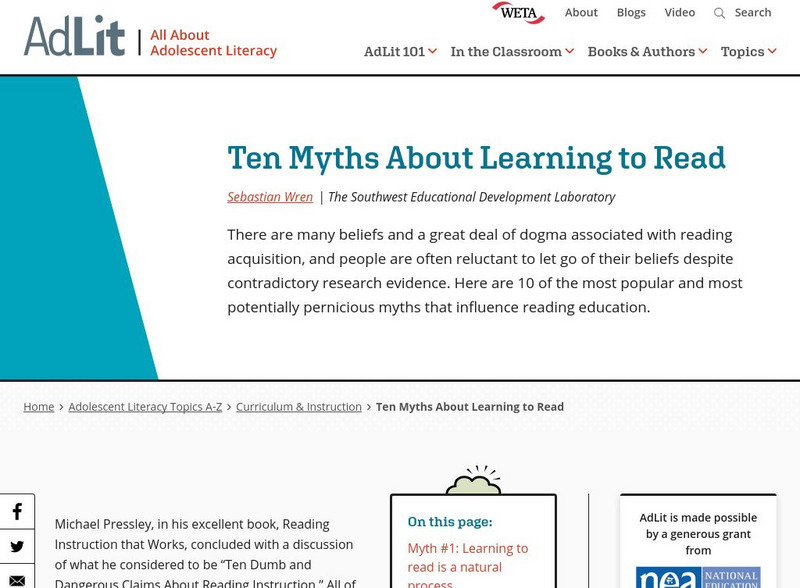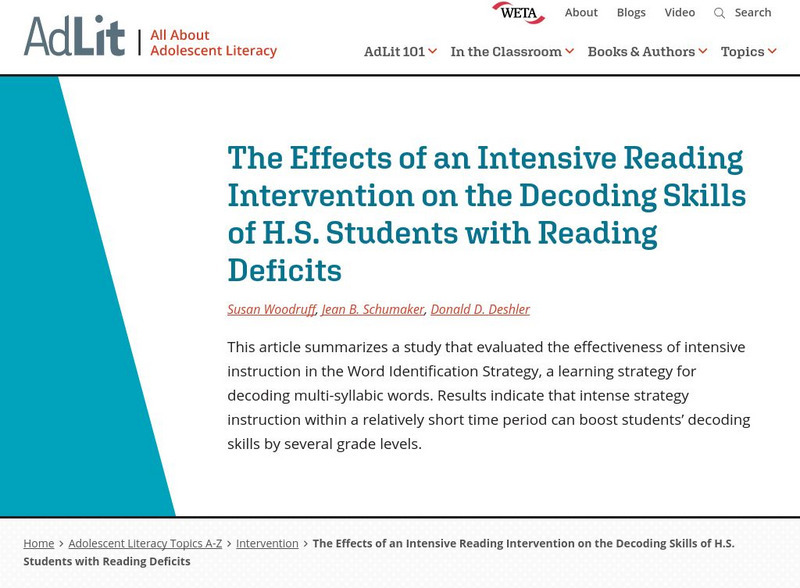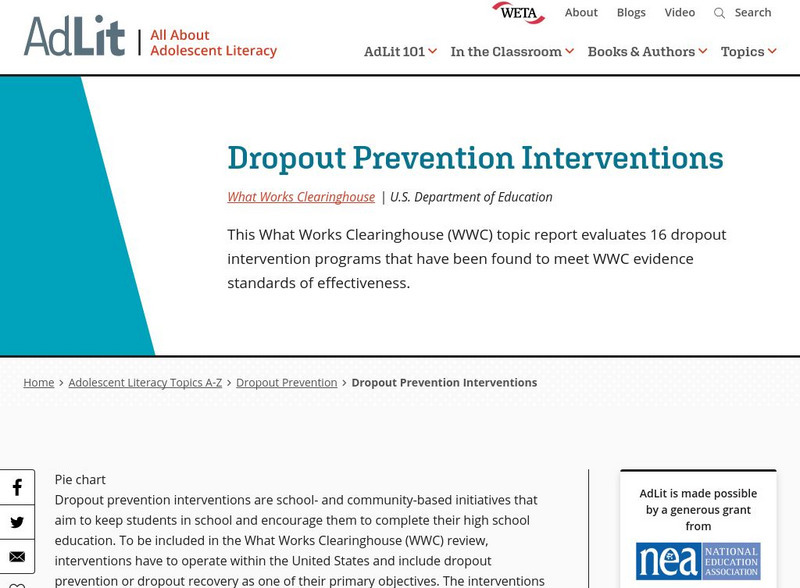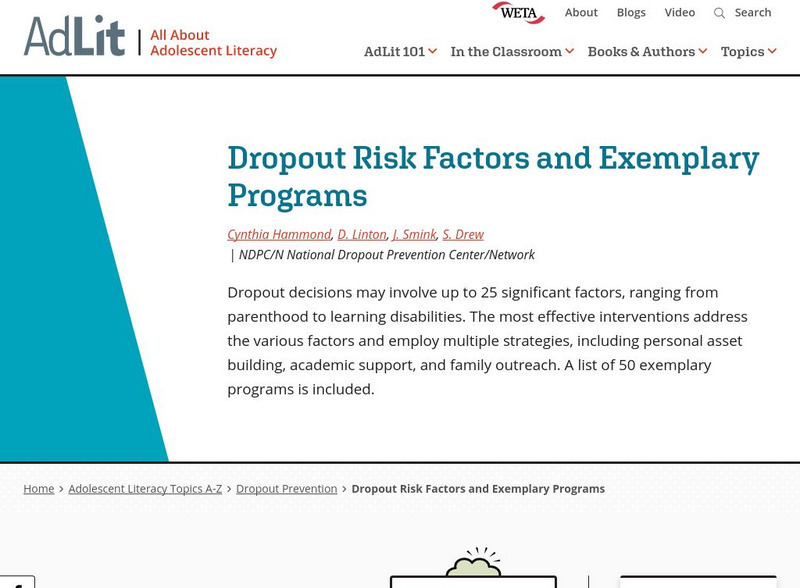AdLit
Ad lit.org: Fitting Response to Intervention Framework to Mathematics Education
While there is a great deal of information on reading and RTI, there is a dearth of research on math with RTI. Thus, the development and implementation of reading and RTI has blazed a path to RTMI (Response to Math Intervention).
AdLit
Ad lit.org: Using Technology to Support Struggling Students
Knowing how to engage in signature scientific acts, such as formulating questions and using evidence in arguments is an important part of science learning. This InfoBrief from the National Center for Technology Innovation offers more...
AdLit
Ad lit.org: Using Technology to Support Struggling Students
Science learning often involves creating abstract representations and models of processes that we are unable to observe with the naked eye. Learn more about visualizing, representing, and modeling to aid struggling learners.
AdLit
Ad lit.org: Using Technology to Support Struggling Students
In an increasingly complex world, all students need to be scientifically literate. While some students may go on to pursue advanced careers in the sciences, basic scientific literacy is critical for all students.
AdLit
Ad lit.org: Using Technology to Support Struggling Students: Vocabulary
To be scientifically literate, students must be able to express themselves appropriately. Learn how to help struggling students master specific vocabulary and be able to use it in their science writing activities.
AdLit
Ad lit.org: Why Teach the Holocaust?
Teachers often find the Holocaust to be an overwhelming subject to approach with their students. While the Holocaust offers important lessons to today's students, it can be a difficult to find the appropriate amount of information to...
AdLit
Ad lit.org: Curricular Connections: Holocaust Remembrance
The Holocaust is often a difficult topic to discuss with students. This guide offers tips for approaching the subject, as well as cross-curricular connections for a more meaningful reading experience.
AdLit
Ad lit.org: Teaching Content Knowledge and Reading Strategies in Tandem
Many areas of instruction can have a rippling effect for the expansion of readers' repertoire of skills, including pre-reading, predicting, testing hypotheses against the text, asking questions, summarizing, etc. Literacy-rich,...
AdLit
Ad lit.org: Content Area Literacy: History
The ability to read historical documents including contemporary explications about societal, economic and political issues provides a direct link to literacy as preparation for citizenship. As in the other disciplines, schools are unique...
AdLit
Ad lit.org: Content Area Literacy: Science
The demands of comprehending scientific text are discipline specific and are best learned by supporting students in learning how to read a wide range of scientific genres. Besides text structures emphasizing cause and effect, sequencing...
AdLit
Ad lit.org: Professional Development to Improve Adolescent Literacy
Beyond general best practices, what sorts of professional development will help teachers improve the literacy of their older students? This article by the National Council of Teachers of English advocates building professional...
AdLit
Ad lit.org: Reading and Writing in the Academic Content Areas
This issue brief from the Alliance for Excellent Education looks at the role every middle and high school teacher must play to help older students become fully literate, and puts forth a four-part agenda for improving literacy in the...
AdLit
Ad lit.org: The Content Literacy Continuum: Improving Adolescent Literacy
The Content Literacy Continuum (CLC) is a tool for enabling teachers and administrators to evaluate literacy instruction/services offered within a school and to formulate a plan for improving the quality of those services. This article...
AdLit
Ad lit.org: Adolescents and Literacy: Reading for the 21st Century
This report reviews and analyzes existing research on effective literacy instruction and the impact of successful literacy programs for students in grades 4-12.
AdLit
Ad lit.org: Teach to the Test? Just Say No
It is possible for educators to make better choices about how and when to teach to the test than the alarmist newspaper articles and editorials would seem to suggest. This article from the Center for Comprehensive School Reform and...
AdLit
Ad lit.org: School Culture: The Hidden Curriculum
Walk into any truly excellent school and you can feel it almost immediately - a calm, orderly atmosphere that hums with an exciting, vibrant sense of purposefulness. This is a positive school culture, the kind that improves educational...
AdLit
Ad lit.org: Rti and Reading: Response to Intervention in a Nutshell
RTI is not a particular method or instructional approach, rather it is a process that aims to shift educational resources toward the delivery and evaluation of instruction that works best for students. This article provides a quick...
AdLit
Ad lit.org: Principal as Instructional Leader: Designing a Coaching Program
Research shows that effective school leaders focus on improving classroom instruction, not just managerial tasks. A natural way for school leaders to take on the role of instructional leader is to serve as a "chief" coach for teachers by...
AdLit
Ad lit.org: Ten Myths About Learning to Read
There are many beliefs and a great deal of dogma associated with reading acquisition, and people are often reluctant to let go of their beliefs despite contradictory research evidence. Here are 10 of the most popular and most potentially...
AdLit
Ad lit.org: So if Retention Is So Harmful, What Should We Do? Teach!
Studies on grade retention reach the same conclusion: Failing a student, particularly in the critical ninth grade year, is the single largest predictor of whether he or she drops out. What must teachers know to identify students' needs...
AdLit
Ad lit.org: The Components of Effective Vocabulary Instruction
Effective vocabulary instruction begins with diverse opportunities for word learning: wide reading, high-quality oral language, word consciousness, explicit instruction of specific words, and independent word-learning strategies. This...
AdLit
Ad lit.org: Effects of Intensive Reading Intervention of Decoding Skills
This article summarizes a study that evaluated the effectiveness of intensive instruction in the Word Identification Strategy, a learning strategy for decoding multi-syllabic words. Results indicate that intense strategy instruction...
AdLit
Ad lit.org: Dropout Prevention Interventions
This What Works Clearinghouse (WWC) topic report evaluates 16 dropout intervention programs that have been found to meet WWC evidence standards of effectiveness.
AdLit
Ad lit.org: Dropout Risk Factors and Exemplary Programs
Dropout decisions may involve up to 25 significant factors, ranging from parenthood to learning disabilities. The most effective interventions address the various factors and employ multiple strategies, including personal asset building,...
